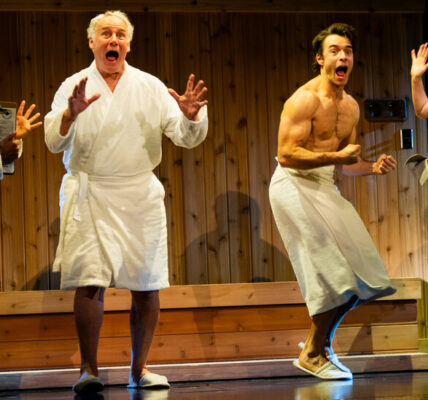It’s a gentle story, full of tender moments, and knowing that the parents and daughter in the main cast are a family in real life increases the warmth. There’s a complexity to their conversations, the way their interactions are never one-note (as parents and teens often are in films), that you can sense has its roots in real life. By the end of the film, their emotional bond carries the story. Have a few tissues on hand.
In some places, “Ghostlight” can feel a little contrived. Early in the film, having met the theater troupe but perplexed by Shakespeare’s language, Dan enters Daisy’s room and asks, “Do you know this play ‘Romeo and Juliet’?” He says it as if he’s not sure his daughter — who has taken AP English and lives for the theater, tacking Playbills to the wall — will know what he’s talking about, since he barely does. It’s a moment that feels false; I wasn’t sure if Dan wasn’t supposed to know of “Romeo and Juliet” because he wasn’t paying attention to anything in the last 50 years of his life, or because he’s a construction worker. Later, Daisy — who can quote it verbatim, and loves the Baz Luhrmann movie, even if “it’s old” — has to explain to him what happens at the end of the play. “Here’s a hint — it’s a tragedy,” she says.
Knowing the plot of “Romeo and Juliet” is in fact important to following the full emotional arc of “Ghostlight,” so I understand the impulse. But it feels clunky, as does Dan’s first encounter with the theater troupe and decision to come back. Not impossible. Just distracting.
Yet by the end, “Ghostlight” won me over, partially because the theme of theater as therapy takes on a deeper, richer meaning as the plot unfolds. Part of the power of Shakespeare’s plays comes from their infinite capacity for reinvention — their ability to be restaged in every culture and find new resonance there. “Ghostlight” plays on this while weaving a tale of its own, making the case that theater’s allure comes not from its plot, but the way we’re invited to participate in it, whether actor or audience. Performing a play, we step into someone else’s shoes, and if we’re any good at it we start to understand who they are a little more. If we’re watching it right, we inhabit their world too.
Ghostlight
Rated R for some language and sad, mature Shakespearean themes around death. Running time: 1 hour 50 minutes. In theaters.




